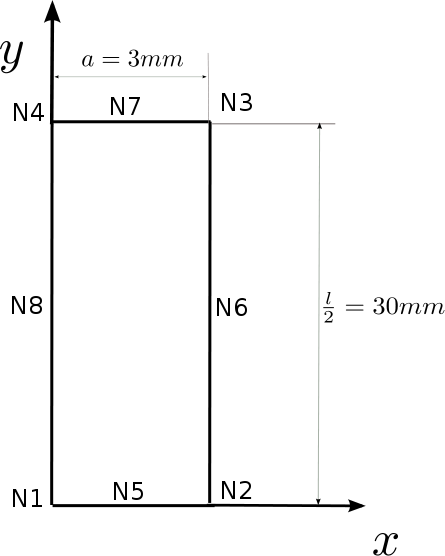4. B modeling#
4.1. Characteristics of modeling#
We use a AXIS model.
In this case, the coefficient \({K}_{D}\) is chosen depending on the temperature and on \({\sigma }_{0}\).
T (°C) |
0 MPa |
100 MPa |
200 |
200 MPa |
900 |
14,355 |
14,855 |
15,355 |
|
1000 |
14.5 |
15 |
15.5 |
|
1025 |
14.5363 |
15.0363 |
15.5363 |
15.5363 |
1050 |
14.5725 |
15.0725 |
15.5725 |
15.5725 |
Table 4.1-1 : K_D of B modeling
The discretization in time is quite fine:
(JUSQU_A = 2, NOMBRE = 10),
(JUSQU_A = 2., NOMBRE = 10),
(JUSQU_A = 20., NOMBRE = 10),
(JUSQU_A = 200., NOMBRE = 10),
(JUSQU_A = 2000., NOMBRE = 10),
(JUSQU_A = 20000., NOMBRE = 10),
(JUSQU_A = 200,000., NOMBRE = 10),
(JUSQU_A = 1000000., NOMBRE = 30),
(JUSQU_A = 1600000., NOMBRE = 30),
(JUSQU_A = 1700000., NOMBRE = 40),
(JUSQU_A = 1800000., NOMBRE = 40),
(JUSQU_A = 1900000., NOMBRE = 40),
(JUSQU_A = 2000000., NOMBRE = 40),
(JUSQU_A = 2100000., NOMBRE = 40),
(JUSQU_A = 2200000., NOMBRE = 40),
(JUSQU_A = 2300000., NOMBRE = 40),
(JUSQU_A = 2400000., NOMBRE = 40),
(JUSQU_A = 2500000., NOMBRE = 40),
4.2. Characteristics of the mesh#
It is chosen to represent the cylindrical test piece by a quadrangle with 8 knots in axisymmetry.
Number of knots: 8
Number of stitches: 1 (QUAD8)

Image 4.2-1: Modeling B mesh
4.3. Tested sizes and results#
Evolution of the constraint, \({\sigma }_{0}\), as a function of time. This value is tested at various times:
Instant |
Reference Type |
Reference |
Tolerance (%) |
1000000 |
“ANALYTIQUE” |
75.97849999999999997 |
0.5 |
1600000 |
“ANALYTIQUE” |
55.54209999999999998 |
10.0 |
Table 4.3-1 : B modeling results**
Evolution of the damage variable, \(D\) as a function of time. This value is tested at various times depending on the modeling:
Instant |
Reference Type |
Reference |
Tolerance (%) |
1000000 |
“ANALYTIQUE” |
0.110134 |
1.0 |
1600000 |
“ANALYTIQUE” |
0.28131600000000001 |
10.0 |
Table 4.3-2 : B modeling results
Evolution of the viscoplastic isotropic work hardening variable, \(r\), as a function of time. This value is tested at various times:
Instant |
Reference Type |
Reference |
Tolerance (%) |
1000000 |
“ANALYTIQUE” |
2.747799999999999999E-3 |
0.5 |
1600000 |
“ANALYTIQUE” |
2.79276E-3 |
0.5 |
Table 4.3-3 : B modeling results
Evolution of the viscoplastic isotropic work hardening variable, \(p\), as a function of time. This value is tested at various times:
Instant |
Reference Type |
Reference |
Tolerance (%) |
1000000 |
“ANALYTIQUE” |
2.7607899999999999E-3 |
0.5 |
1600000 |
“ANALYTIQUE” |
2.814779999999999998E-3 |
0.5 |
Table 4.3-4 : B modeling results**